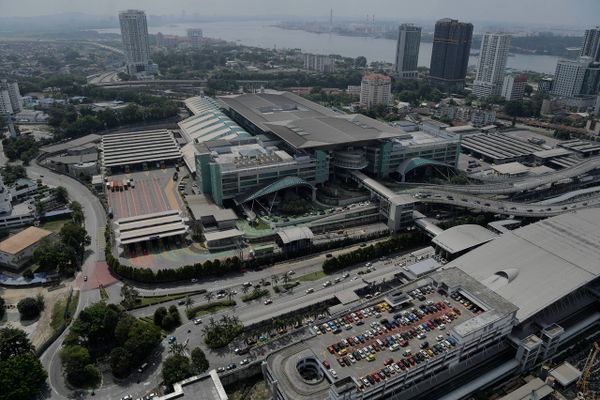JOHOR BAHRU, May 27 — Beginning June 1, the quick response (QR) code system will be used for immigration clearance at the Sultan Iskandar Building (BSI) Customs, Immigration, and Quarantine (CIQ) Complex and the Sultan Abu Bakar Complex (KSAB).
Deputy Prime Minister Datuk Seri Fadillah Yusof said the system's proof-of-concept (POC) would run for three months and only involve Malaysians.
The first phase of the QR code system for immigration clearance involves Malaysians travelling to Singapore by bus and motorcyclists using the MBike immigration clearance system at BSI and KSAB.
"It will start with Malaysians first and then be expanded to others if this proof-of-concept is successful.
"For this QR code system, all Malaysians travelling to Singapore can use the MySejahtera application or the MyTrip system," he said during a press conference after chairing the special committee meeting on the Johor Causeway congestion issue at BSI today.
Also present were Home Minister Datuk Seri Saifuddin Nasution Ismail and Johor Menteri Besar Datuk Onn Hafiz Ghazi.
Fadillah added that implementing this QR code would reduce the waiting time for BSI bus users during peak hours from 120 minutes to 15 minutes, an 83 per cent time saving, while the waiting time for buses at KSAB can be reduced from 90 minutes to 15 minutes, a 74 per cent time-saving.
Motorcyclists can reduce their waiting time at BSI from 40 minutes to 30 minutes, a 19 per cent time saving, while the waiting time for motorcyclists at KSAB can be reduced from 45 minutes to 30 minutes, a 23 per cent time-saving.
In March, Singapore started rolling out an initiative allowing motorists arriving and departing from its Woodlands and Tuas checkpoints to use QR codes instead of passports for faster immigration clearance.
Meanwhile, in a statement Fadillah said that today’s meeting also agreed to endorse 26 new initiative proposals with an estimated allocation of RM130 million for Phase Four.
Seven ‘quick win’ initiatives worth RM1.75 million will be implemented immediately using the existing Home Ministry allocation, while the remaining 19 new initiative proposals worth RM128.25 million will require new applications from the Economy Ministry.
"This amount will also be detailed further with the Economy Ministry noting that the implementation of existing initiatives in Phase One has commenced since 2019.
"For the implementation status of the 21 initiatives in Phase One, 17 initiatives or 81 per cent, have been fully completed; three initiatives or 14 per cent, are currently being implemented and are expected to be fully completed by February 2025; and one initiative or five per cent has not been implemented yet (still in the procurement process).
"For implementing the four new initiatives in Phase Two, two initiatives have been implemented and two initiatives are currently being implemented.
"For the implementation of new initiatives in Phase Three, one initiative has been postponed, namely the addition of 44 MBikes. Additionally, two initiatives are still in the early stages, including documentation preparation, while one initiative regarding the construction of a sheltered pedestrian walkway along the Johor Causeway has been dropped after consultation with Johor JKR (Public Works Department) due to limited space and existing infrastructure density," he said.
Earlier, Fadillah conducted a surprise inspection at the BSI at 4.15am to observe the process of inbound and outbound travel there.
He also met with the commuters and the officers, and personally inspected the bus lanes and take pictures using his mobile phone.
— Bernama




